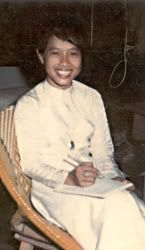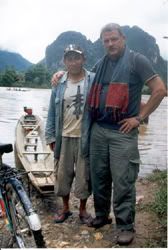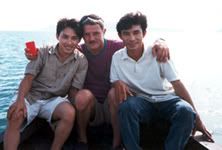 Her grave is set near her family’s home, adjacent to a large grove of coconut palms, beside the backwater of a peaceful lagoon east of Hoi An. She died far away, in childbirth, bringing twin girls into the world in the high plateau country of Dac Lac Province. One of her newborn daughters died. One survived. It was not a good time in that part of the world. It was 1978. She was 31 years old.
Her grave is set near her family’s home, adjacent to a large grove of coconut palms, beside the backwater of a peaceful lagoon east of Hoi An. She died far away, in childbirth, bringing twin girls into the world in the high plateau country of Dac Lac Province. One of her newborn daughters died. One survived. It was not a good time in that part of the world. It was 1978. She was 31 years old.
A portion of his ashes lies buried next to her tomb. Another portion, the larger amount, rests in an urn in a Buddhist Temple in Ho Chi Minh City, nearly 900 km to the south. His name was John. He was a US Navy Hospital Corpsman. Her name was But (sounds like “boot”, pronounced with a rising inflection). She was a Vietnamese nurse.
I knew John for less than a year, the last year of his life. It was an honor to have known him and to have been his friend. I hadn’t known But, but I knew of her, and about her unfortunate death, years before I knew John.
This is a true story. It became known locally as “A Vietnamese Love Story”
John was a veteran of the Vietnam War, or as it’s known in Viet Nam, “The American War.” One of my earliest contacts with him was late in 2001. He was living in Australia.
He e-mailed me about But after learning that she had died and told me about his plans to return to Viet Nam:

 As a Corpsman and a life long observer of people I think my collective knowledge will serve me well in this instance as it has in the past. I will consult with P. about how best to do what I plan to do, especially when I go to the temple to burn some incense and say a prayer to Buddha for But’s and my spirits.
As a Corpsman and a life long observer of people I think my collective knowledge will serve me well in this instance as it has in the past. I will consult with P. about how best to do what I plan to do, especially when I go to the temple to burn some incense and say a prayer to Buddha for But’s and my spirits.
I am somewhat pantheistic with strong leanings toward Eastern religions as well as native American beliefs. In short do good by your fellow man and be a custodian of The Earth Mother.
I worked very closely with But in ’71 while at HQ 2nd CAG and have several pictures of her. I hold her in the highest regard, largely for her patience with me.
I doubly mourn her loss. She was a fine person and an even better nurse. I’d like nothing better than to present her parents, if alive, or the surviving child, with one or more of the pictures I have. Could that be arranged? I plan to go Vietnam within the next year.
Sadly John
I would help to set up contacts for John in Da Nang, friends who would meet him at the airport and take him to meet But’s family near Hoi An. He returned to Viet Nam the first time in June of 2002.
Upon his arrival in Hoi An he learned of an another unfortunate incident in which But’s surviving daughter had died. He told me his impression was that she had taken her own life but that he could not understand the details.
 John stopped by Bangkok en-route back to Australia. I was due to go to Laos for a new visa and so John agreed to join me. We took an overnight bus to Nong Khai and crossed the Mekong into Laos early the following morning. We spent several days in Laos and traveled from Vientiane to Vang Vieng, a picturesque village in a serene valley frequented by low-budget backpacker tourists.
John stopped by Bangkok en-route back to Australia. I was due to go to Laos for a new visa and so John agreed to join me. We took an overnight bus to Nong Khai and crossed the Mekong into Laos early the following morning. We spent several days in Laos and traveled from Vientiane to Vang Vieng, a picturesque village in a serene valley frequented by low-budget backpacker tourists.
While we were there John shared memories from his time in Viet Nam – from his experiences during the war and from his recent trip. He took special pride in his accomplishments while assigned to 2nd CAG. He told me many stories about what he did there taking care of wounded Marines as well as injured and sick Vietnamese civilians and of going on med-caps to rural villages. He also told me of his fondness, respect and admiration for his co-worker, Tran thi But. He told me that through the years since he left Viet Nam he had never forgotten her and often wondered how she fared when the war ended. I sensed that he loved her and was still mourning her death.
 Unknown to me and to John before he returned to Hoi An, But also had two sons who lived in Saigon. When he learned of this he arranged for them to come to Hoi An and he took a serious interest in their welfare and had plans for assisting them to help jump start them on their way through life. He had “adopted” them as sons and they looked to him as a father. He had them enroll in English classes in Saigon.
Unknown to me and to John before he returned to Hoi An, But also had two sons who lived in Saigon. When he learned of this he arranged for them to come to Hoi An and he took a serious interest in their welfare and had plans for assisting them to help jump start them on their way through life. He had “adopted” them as sons and they looked to him as a father. He had them enroll in English classes in Saigon.
While here in Thailand we looked at motorbikes. One of “his boys”, as he like to call them, was a motorbike taxi driver and his bike had seen much better days. John was planning on getting him a new one and was trying to figure out what might be appropriate. But’s other son was a mechanic and John planned to purchase tools for him to use in his work.
John suffered from chronic PTSD. His first trip back had been a very heavy one emotionally. He wasn’t sure what to do next. I encouraged him to return again if he had no other plans, and spend time getting better acquainted with But’s two sons.
In early July he would travel back again to check on “his boys” and to see what else he could do for them and for the local people of the area. On the night of July 3 I had one of those horrible Viet Nam nightmares, re-playing once again the same theme I have seen for decades. They had become less frequent as the years passed but were equally as frightening as they had been in years gone by. That same night in a hotel room in Hoi An John died of a heart attack. A police investigation followed and determined that there had been no foul play.
 John’s brother arrived from Australia and working through the US Consulate in Ho Chi Minh City and the Vietnamese government, permission for local cremation was obtained and John’s remains were placed in an urn kept in a temple near the homes of But’s son’s, “John’s boys”. I went over to help with what I could and with local friends and But’s family, arranged for a simple private ceremony at a temple in Hoi An. A small portion of John’s remains, with the permission of But’s family, were laid to rest beside her tomb. A large number of people were involved and helped. Interestingly there were people who had been on opposite sides during the war years and who had joined efforts in making sure everything was handled properly and and that John’s brother, on his first trip to that part of the world, was made to be as comfortable as possible.
John’s brother arrived from Australia and working through the US Consulate in Ho Chi Minh City and the Vietnamese government, permission for local cremation was obtained and John’s remains were placed in an urn kept in a temple near the homes of But’s son’s, “John’s boys”. I went over to help with what I could and with local friends and But’s family, arranged for a simple private ceremony at a temple in Hoi An. A small portion of John’s remains, with the permission of But’s family, were laid to rest beside her tomb. A large number of people were involved and helped. Interestingly there were people who had been on opposite sides during the war years and who had joined efforts in making sure everything was handled properly and and that John’s brother, on his first trip to that part of the world, was made to be as comfortable as possible.
 The evening after the service John’s brother and I stopped off a tailor shop in Hoi An. We had a brief wait as he was having some articles of clothing altered. Several local people were there chatting with the shop owners in typical small town fashion and the topic was the American who had been found dead in a local hotel. They had no inkling of the connection between John and the two foreign customers sitting among them in the shop. To them we were just two of many foreign tourists who visit their historic town. They seemed to know all of the details about the local girl, But, and the American. People in Da Nang, people in Hoi An were talking about it, they said.
The evening after the service John’s brother and I stopped off a tailor shop in Hoi An. We had a brief wait as he was having some articles of clothing altered. Several local people were there chatting with the shop owners in typical small town fashion and the topic was the American who had been found dead in a local hotel. They had no inkling of the connection between John and the two foreign customers sitting among them in the shop. To them we were just two of many foreign tourists who visit their historic town. They seemed to know all of the details about the local girl, But, and the American. People in Da Nang, people in Hoi An were talking about it, they said.
And so, the story of But and John came to be known in Quang Nam Province as a Vietnamese love story. And, for a country, which until very recently, had been at war for many generations, and in which most love stories had tragic endings, indeed the story of John and But fit the pattern very well.







